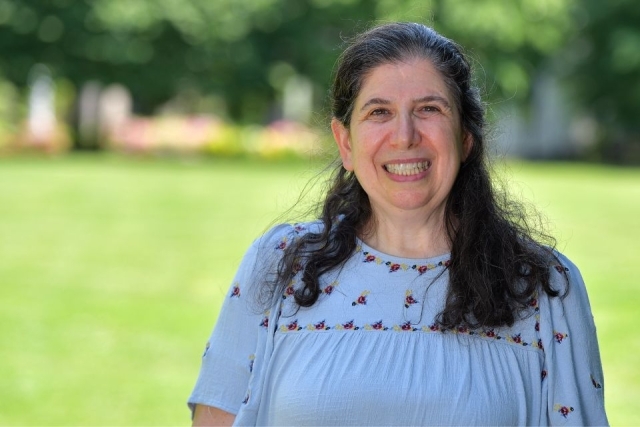
A St. John’s University professor recently received a four-year National Institutes of Health (NIH) grant totaling more than $650,000 to study the efficacy of DMA, a compound found to prevent preterm birth. This SuRE grant is awarded to institutions with students from backgrounds nationally underrepresented in biomedical research.
Sandra E. Reznik, M.D., Ph.D., has long been interested in the phenomenon of preterm birth. It is a problem that disproportionately affects underserved populations, occurring in more than 10 percent of deliveries in most countries, and is the leading cause of neonatal mortality.
A trained pathologist, Dr. Reznik, a Professor in the Department of Pharmaceutical Sciences in the College of Pharmacy and Health Sciences, counts perinatal pathology as her area of expertise. Pathologists help doctors choose their treatments by studying specimens removed from the body.
“I specifically look at material related to pregnancy,” she explained. “There are still pressing problems when it comes to women’s health, and one of the most common is the issue of preterm birth,” which is commonly defined as occurring prior to 37 weeks of gestation.
The earlier the child is born, the direr the consequences, Dr. Reznik stressed. In addition to being the leading cause of infant death, children born prematurely suffer from a raft of issues including cerebral palsy and blindness.
“So little progress has been made in this field,” Dr. Reznik offered, noting that advances in diseases such as cancer, even in the last two decades, are light years beyond the study of preterm birth.
Within the developed world, the US has the highest rates of preterm birth, Dr. Reznik said, and there is no drug approved by the US Food and Drug Administration for its treatment. Ensuring there are no toxic side effects for the mother and the child complicates and lengthens the drug approval process.
“You also have to prove that babies being born later lead to better outcomes,” she said.
Like so many scientific breakthroughs, the story behind Dr. Reznik’s grant results from an accident. The drug excipient, known as N,N-dimethylacetamide (DMA), is a solvent in which potential drugs are dissolved for delivery into the bloodstream. A graduate student of Dr. Reznik’s injected the solvent alone into a mouse without a drug (which is standard practice to ensure nontoxicity) and the DMA alone prevented preterm birth.
DMA became the focus of Dr. Reznik’s team—which led to other positive discoveries. “DMA is widely used as a drug excipient for many different drugs in the pharmaceutical industry, and there might be other benefits, such as inflammation suppression,” she explained. “We are repurposing this widely used drug excipient in which the toxicology has already been worked out. The other main way in which we’re innovating is in how we administer the drug,” she said.
Dr. Reznik is collaborating with another colleague in the department on a formulation that contains DMA, which can be delivered vaginally in a nanoformulation (i.e., packaged in such a way that delivers it more efficiently). Delivering it vaginally also ensures a more rapid delivery, increasing safety for both mother and child, Dr. Reznik stressed.
A faculty member at St. John’s since 2004, Dr. Reznik considered it a second home almost immediately. “It’s a very attractive place to work,” she offered, adding that at other institutions the pressure to receive grant funding is incredibly intense. At St. John’s, Dr. Reznik feels as though she is given all of the necessary tools to succeed, including state-of-the-art laboratory equipment, talented graduate students, and administrative support.
She is proud to say that several of her former students are now colleagues in the industry with whom she maintains regular contact. “Watching them become peers has become hugely satisfying,” she said.
“Our top students can be successful anywhere in the world,” Dr. Reznik said. “They are very driven and ambitious—and absolutely inspiring and a real joy to work with on campus.”
Related News
Q&A with School of Education Alumna Linda I. Rosa-Lugo, Ed.D. ’77ED, ’79M.S.Ed.
Linda I. Rosa-Lugo, Ed.D. ’77ED, ’79M.S.Ed., recently accepted a new role as President of the American Speech-Language-Hearing Association (ASHA). Prior to this, Dr. Rosa-Lugo has been an active...
Insurance Leader of the Year Dinner Raises $3.6M for GSRM Students
A global gathering of aspiring students, insurance industry executives, and other supporters of the Greenberg School of Risk Management, Insurance and Actuarial Science (GSRM)—part of The Peter J...
TSOE Alumna Appointed Director of Curriculum in Amityville
Jessica Kemler ’99ED,’22Ed.D.—a double alumna of The School of Education at St. John’s University—began the new year as the new Director of Curriculum in the Amityville, NY, School District. “We are...
